A Matter of Honor
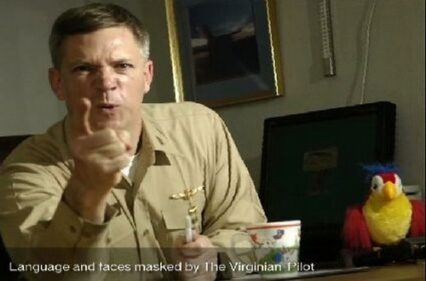
You can say it is PC run amok, again, but of course PC is a political agenda, and politics never sleeps.
I have been watching the slow-motion embarrassing disintegration of the career of Captain Honor Owen, Captain of the Good Ship Enterprise, with no little emotion.
The videos have been around for quite a while, at least four years, and only bothered some of the crew. By report, most of the sailors, men and women alike, loved them, since they continued the tradition of bawdy Foc’sle Follies bawdy humor that is older than Davy Jones Locker.
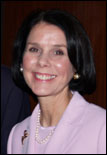
I was amazed to see Elaine Donnelly of the Center for Military Readiness blaming the Chairman for the conduct of Captain Owen, and demanding his relief on the same grounds.
The whole controversy causes me to digress a bit.
I would not have made it in today’s Navy. My first effort at writing a book came from a daily column that ran in the USS Midway’s little newspaper, The Midway Multiplex. I published when we were in the Indian Ocean, cut off from everything except the short-wave radio and movies, an isolation we shared with The Old Navy that goes back to the dawn of time. My storied were mostly about booze, a bumbling private dick named Nick Danger, and an Australian girl of questionable virtues.
Bawdy? Sure. Irreverent? Of course. My Boss Vince told me much later that some kill-joy up the chain- probably one of those fag SWOS- of wait, I can’t say that in jest anymore- wanted to scuttle the series, but the move was squashed by the Admiral commanding the battle group, Bob “Mr. Indian Ocean” Kirksey. He thought the humor kept us a little looser, a little happier, and a little more ready to take on the Iranians if it came to that in the Hostage Crisis of the day.
We were all male, and nearly all young. There is a certain strain of insanity that goes along the isolation, the boredom and the stress, and when the long line periods were over, the Follies enabled the Junior Officers to bow off steam about the rigidity of the chain of command. The humor was crude and in questionable taste. So long as it was confined to the follies, there was immunity from retribution by the chain of command.
Since the Follies happened only a day or two before we hit port and were able to walk on sweet dirt again, the whole thing vanished in the fevered dream of getting ashore and blowing off steam. And testosterone.
Technology was the downfall of Captain Owen Honors, Fighter Pilot Extraordinaire. You want aggression in fighter pilots, and it is encouraged. Honor was an instructor at Top Gun, selected for precisely that trait. His judgment at stick and throttle is unquestioned, but unfortunately that did not extend to his political sensibility.
I winced when I saw the videos, not that I not heard or seen worse at the Follies (or written racier material that still stands as the only continuing detective story broadcast by US Naval Message to the outlying escorts of the CV Battle Group). The topics he featured in his videos intended for the crew of the USS Enterprise were an exercise in both tradition and megalomania. But I did mention that he was a fighter pilot, right?
When I returned to the Fleet and deployed to the Med in USS Forrestal, I intended to launch a new detective series featuring a character named Rex Bueno, Special Agent, Navy Resale System (copyright 1989, Vic Socotra).
It would have been just as raunchy as Nick Danger. The series petered out, no pun intended, after a few episodes, due to lack of demand. Technology had connected the ship to the shore, and there was daily fresh media content and real live television. There was no need to grow our own entertainment, except for the Follies at the end of cruise.
What speared CAPT Honors was technology. The videos were done four years ago, deemed to represent an old tradition that was unsuitable for broad consumption, and dealt with then. But someone was offended, and the very nature of the media Owen used meant that the offensive words continued to exist in the context they were uttered years ago.
The echoes of the old Foc’sle Follies bounced off the steel girders and deck plates and dissipated forever. The DVD lasts forever, and someone held onto copies, biding their time to hoist the swaggering fighter pilot on his own petard.
The cast of characters is the same this time around, even if the topic has mutated.
Elaine Donnelly, the spokesperson for the Center for Military Readiness, was in the middle of the last fight in the military over women in combat. SecDef Cap “The Knife” Weinberger appointed Elaine to the Defense Advisory Committee on Women in the Services (DACOWITS) for a three-year term (1984-1986). In 1992, President George H.W. Bush appointed her to the Presidential Commission on the Assignment of Women in the Armed Forces. She is a critical part to this story.
The nature of the insurgencies in Iraq and Afghanistan is such that there is no front line and women have been fighting, wounded and killed even in allegedly non-combat arms roles. That process has been going on for a decade now, and the argument is all but over, even if there is a rear-guard action against women being assigned to submarines.
It was over even at the beginning, even if there were bumps. In one of the Air Wings I certified ready for combat, one of the most accomplished attack pilots preferred to wear pink nail-polish; the Strike Hornets are fly-by-wire, and bench pressing a ton is not a requirement.
So this whole thing about Owen Honors and his racy videos takes me back in time.
Elaine’s appointment to DACOWITS was intended to provide a conservative balance to an inherently progressive bias on the panel. The Committee itself was a response to a Congressional mandate to advance the integration of women in the armed services.
The panel, who toured the globe to examine the force. The active military viewed them with suspicion and a certain dread. I mean, the whole enterprise of going to sea and safely launching and recovering airplanes on a pitching deck in the black of night is difficult enough without running a social experiment. Mission first, right?
That was of no consequence to those who believed the exclusionary policy was unconstitutional and wrong. There was a higher truth involved, and I understand both ends of the argument. Where you stand is where you sit. The DACOWITS panel reported out in 1986, the year before a talented aeronautical engineer named Kara Hultgreen joined the Navy through Aviation Officer Candidate School. I share the alma mater with her, poor kid.
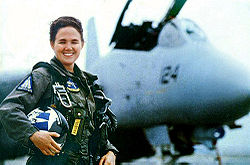
Elaine was part of a minority report to the main panel, which recommended that many of the combat arms be opened to women. There was a definite political agenda on the panel, and the old Bulls of the Navy (not to mention the other Services) were fiercely opposed.
I was at the Bureau of Personnel then, a hot-house aggregation at the Navy Annex down the road that contained all the little communities that make up the Big Navy. I am not letting you in on anything new when I say that, Uniform Code of Military Justice aside, there have always been gays and lesbians in the service. In those days, though, only a few communities had fairly robust communities of feminists and lesbians, and there were no visible gay male support structures.
The Nurse Corps was one of them, and was fiercely protective of its own. The General Unrestricted Line (archly named by the guys the GURL) was predominately female, and like the nurse corps, had a challenge in ensuring that partnerships could be collocated at duty stations without the official and sanctioned institution of marriage. It was weird, and there were feminists outside the service who formed close alliances to force change on the services.
My understanding of what happened, based on the reporting of a fellow junior officer In one of GURL detailing shop, was that the Navy leadership of the time quietly let it be known that if the feminists within the service came out too vocally in support of the DACOWITS agenda, the NIS was going to be directed to get serious on rooting out sexual violations of the UCMJ in all the places they existed.
It was war in the Navy, a cold one, but quite real.
The feminists had to back down, but the idea that they were done was a serious delusion on the fighter mafia that led the service. The senior detailer of the GURL community had to be satisfied with gaining a change to the Uniform Board that permitted women officers the right to wear the sword.
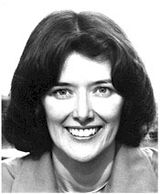
The great champion of the cause of women on the Hill was Rep. Patricia Schroeder, a Colorado Democrat and first woman to serve on the House Armed Services Committee.
You cannot get to Kara Hultgreen from Elaine Donnelly without going through pat Schroeder, but you have to put fighter pilots in the middle. Like Captain Owens, the breed had a blind spot big enough to drive several A-6 Intruders.
The first Gulf War, sequentially following the abrupt disintegration of the Soviet Union made for some giddy times. The professional association of Naval Carrier Aviation- the Tailhook Association- was renowned for its cocky attitude and irreverent outlook. It was, quite literally, the swaggering fist of the Fleet.
The annual convention in 1991 was sort of the Mother of Foc’sle Follies, held in Vegas, the town known for the motto “What happens in Vegas, Stays in Vegas.”
I was safely in Washington that year, though if I had still been in Air Wing SIX I would have happily jumped at the chance to attend. That year was going to be the celebration of the most successful air campaign since World War Two, and one that the young men who flew there were justifiably proud. They also brought with them the attitude that is best confined to the foc’sle, and not exposed to the general public.
More than a hundred Navy and Marine officers were accused of lewd conduct or outright assault on 87 women at the Las Vegas Hilton. Everyone concerned should have had better judgment. There were undeniably clear violations of the UCMJ, but this was a political and social event as much as it was a case of assault. Some of the officers involved, and many of the Flag officers in attendance just didn’t get it. Times had changed, the world, if not the tailhook navy, had moved on.
The witch-hunt began, and the dinosaurs on the OpNav staff soon began to drift rudderless into extinction.
You may recall that a number of officers were formally disciplined or refused advancement in rank. Observers of the time noted that the scandal highlighted the US military culture’s attitude about sexual harassment, assault, and equal treatment of women in career advancement and opportunity. We were rocked as an officer corps. As a provision of selection boards for advancement, we had to stipulate in writing that we had not been in Las Vegas. Rep. Schroeder was merciless in tormenting the CNO, and the DoD IG investigation was scathing.
It is good reading even today, if you can find a copy. It was “close hold” back then, but pretty racy.
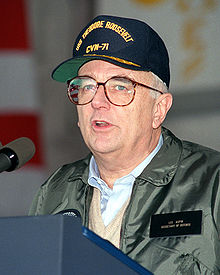
Anyway, Les Aspin was the incoming SecDef, nominated by the new Clinton Administration. He had a mandate for dramatic change in a force that no longer confronted the Soviet Union, only pipsqueaks like Saddam Hussein. Les was known as a Defense Intellectual from his years in Congress, and shared a liberal view with the new Administration. Some of the issues in the campaign had been equal treatment of the sexes in the military, and more; the moment seemed to be at hand to address the matter of openly gay people serving openly.
I mean, they were already there, right?
Les had problems from the beginning. Colin Powell, the most charismatic and empowered Chairman of the Joint Chiefs in history confronted him balefully. A serious heart ailment sidetracked the new SecDef only a month into his time in office, and the President had put him in a tough position with the gay issue front and center, lingering from the Dick Cheney days in the Pentagon.
It was pretty crazy. I was working in the Pentagon then, and the highly charged issue made the air positively electric. In the end, the Aspin Plan to integrate gays resulted in a compromise that made all sides equally unhappy- Don’t Ask, Don’t Tell. it essentially continued the status quo, by which orientation was punishable by dismissal from service, but permissible if kept to oneself.
A highly respected colleague of mine is a lesbian, and served with distinction throughout a demanding thirty-year career in which every day she had to look over her shoulder to see if someone was going to drop a dime on her and her partner.
Awful. But that was the compromise, and it was swiftly followed by the April 1993 announcement on revision of the policies on the assignment of women to combat arms units. The services were to allow women to compete for assignments in combat aircraft; the Navy was to open additional ships for female officers and sailors.
Elaine Donnelly was in the thick of the fight from the right, founding the Center for Military Readiness, and trumpeting that the change in policy on homosexualty and women in combat would swiftly bring about, if not the fall of the West, certainly the significant degradation of America’s combat forces.
I will have to write about that tomorrow, though. That is where Elaine creates the poster child for wrong-headed policy decisions on institutions like the Army and the Navy, and particularly the Marine Corps. Kara Hultgreen, F-14 pilot, call sign “Revlon,” becomes, in death, a powerful political symbol.
Sort of like poor, dim arrogant Captain Honor Owen, a guy who didn’t think one of his gay sailors wouldn’t keep a copy of the DVDs to slip to the media when the time was right.
Like now. Right before deployment.
Copyright 2011 Vic Socotra
